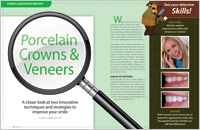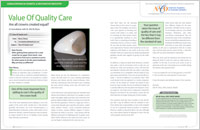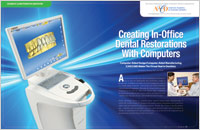An inlay restoration is a custom made filling made of composite material, gold, or tooth-colored porcelain. Porcelain inlays are popular because they resemble your natural tooth. A porcelain inlay is made by a professional dental laboratory and is permanently cemented into the tooth by your dentist.
Inlays can be utilized to conservatively repair teeth that have large defective fillings or have been damaged by decay or trauma. Inlays are an ideal alternative to conventional silver and composite fillings. Also, they are more conservative than crowns because less tooth structure is removed in the preparation of inlays.
As with most dental restorations, inlays are not always permanent and may someday require replacement. They are highly durable and will last many years, giving you a beautiful long lasting smile.
Reasons for inlay restorations:
What does getting an inlay involve?
An inlay procedure usually requires two appointments. Your first appointment will include taking several highly accurate impressions (molds) that will be used to create your custom inlay and a temporary restoration.
While the tooth is numb, the dentist will remove any decay and/or old filling materials. The space will then be thoroughly cleaned and carefully prepared, shaping the surface to properly fit an inlay restoration. A temporary filling will be applied to protect the tooth while your inlay is made by a dental laboratory.
At your second appointment your new inlay will be carefully and precisely cemented into place. A few adjustments may be necessary to ensure a proper fit and that your bite is comfortable.
You will receive care instruction at the conclusion of your treatment. Good oral hygiene practices, a proper diet, and regular dental visits will aid in the life of your new inlay.
Related Dental Crown Articles
 Porcelain Crowns & Veneers
Porcelain Crowns & Veneers
A closer look at two innovative techniques and strategies to improve your smile. In many instances these two restorative techniques can produce nearly identical esthetic results, even though they are structurally different... Read Article
 Value Of Quality Care
Value Of Quality Care
Are all crowns created equal? One of the most important factors adding to cost is the quality of the crown itself. Another fact is that dentists generally sub-contract out crown manufacturing to a dental laboratory technician, as they rarely make crowns themselves... Read Article
 Creating In-Office Dental Restorations With Computers
Creating In-Office Dental Restorations With Computers
Once upon a time, dentists - and patients - needed to wait weeks for a dental laboratory to make crowns and other dental restorations. Now, with an exciting digital technology known as Computer-Aided Design/Computer-Aided Manufacturing (CAD/CAM), some dentists are fabricating high-quality restorations themselves right in their own offices - in minutes! Read Article